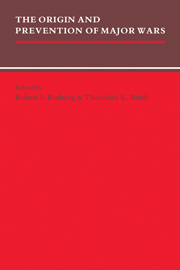Book contents
- Frontmatter
- Contents
- Introduction
- The Origins of War: Structural Theories
- The Origins of War: Explanation of Non-rational Causality
- Lessons and Analogies from Early Major Wars
- Lessons and Analogies from the World Wars
- The Origins of World War I
- Wargames: 1914–1919
- The Origins of World War II in Europe: British Deterrence Failure and German Expansionism
Wargames: 1914–1919
Published online by Cambridge University Press: 02 December 2009
- Frontmatter
- Contents
- Introduction
- The Origins of War: Structural Theories
- The Origins of War: Explanation of Non-rational Causality
- Lessons and Analogies from Early Major Wars
- Lessons and Analogies from the World Wars
- The Origins of World War I
- Wargames: 1914–1919
- The Origins of World War II in Europe: British Deterrence Failure and German Expansionism
Summary
Are there really lessons of the past? The past is certainly a source of knowledge, our only source of knowledge given the flow of time, but, strictly speaking, it does not teach lessons. By lessons I mean maxims for attaining particular outcomes in the present or future: for example, Si vis pacem, para helium, or it is better for a prince to be feared than loved. Insofar as these maxims seem to offer guidance for policymakers, they are usually psychological, not historical. They supposedly summarize human traits that persist regardless of changing historical contexts. Other examples might include the notion that appeasement encourages aggression or that “military decision makers will tend to overestimate the feasibility of an operational plan if a realistic assessment would require forsaking fundamental beliefs or values.” Identification of such allegedly constant traits was the goal of philosophical history and may have seemed an appropriate program for historians during the Enlightenment and their policy-studies heirs. Subsequent historians, however, have usually sought to describe changing societal contexts or outcomes.
- Type
- Chapter
- Information
- The Origin and Prevention of Major Wars , pp. 249 - 280Publisher: Cambridge University PressPrint publication year: 1989

